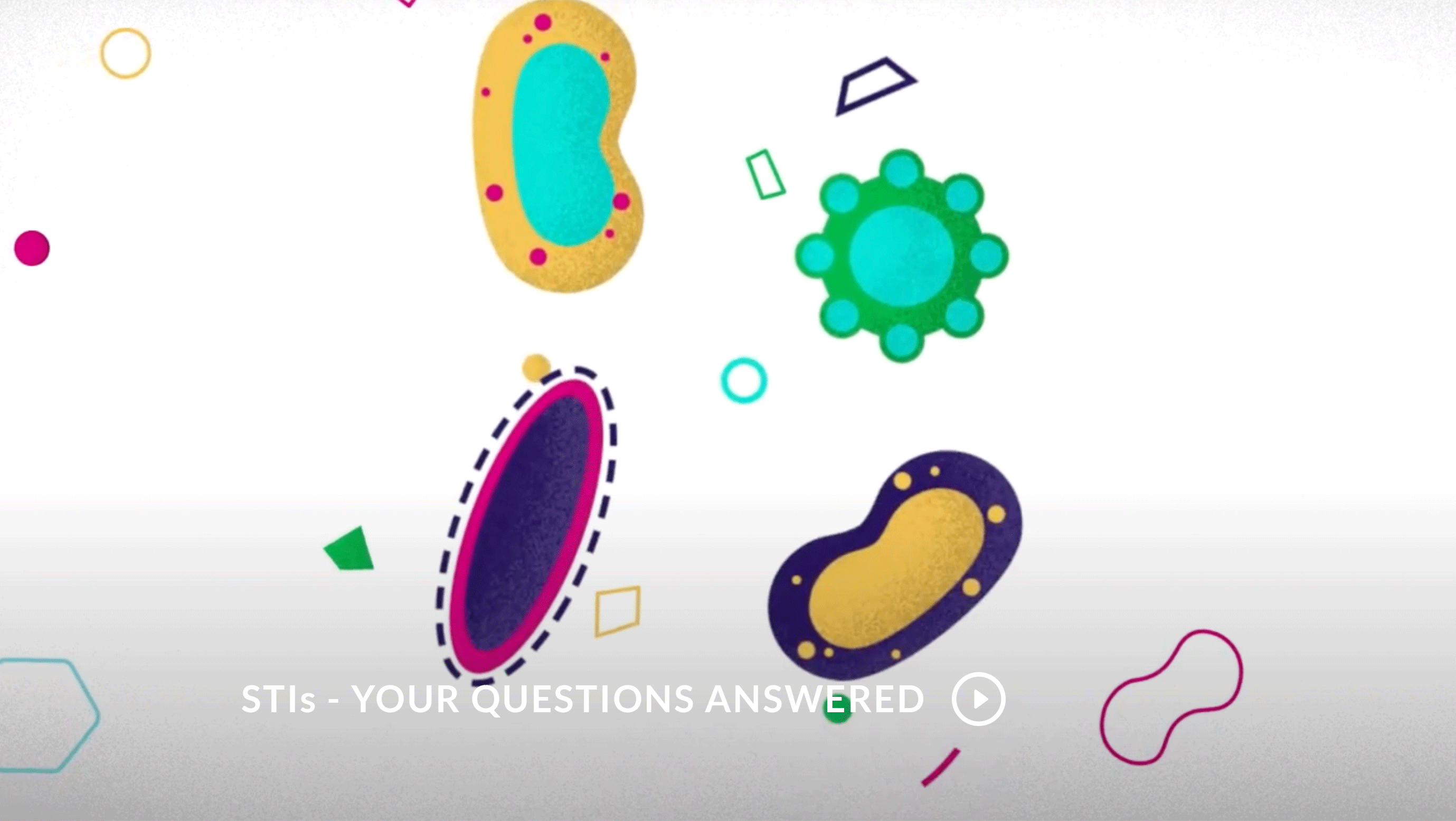Sexually
Transmitted
Infections
STIs are sexually transmitted infections. They are sometimes called sexually transmitted diseases (STDs).
While some STIs are treatable, they can be uncomfortable, painful and some can last forever. Here is what you need to know about the different kinds, how to protect yourself and how to get tested.
What is a sexually transmitted infection (STI)?
Herpes. Chlamydia. Syphilis. Gonorrhea. You may have heard of these. These are all STIs, which are infections anyone can get by having sex.
STIs are caused by bacteria, viruses or parasites, which are passed from person to person through blood, semen, vaginal fluids or other bodily fluids.
You can get an STI any time you have any kind of sexual activity or sex (vaginal, anal or oral), including the very first time you have sex. Especially if you’re not having safe sex. Remember, condoms are the only way to help prevent STIs.

What are the most common STIs?
Here are the most common STIs:
- HPV – Human papillomavirus (HPV) is the most common STI. You can get it by having vaginal, anal or oral sex with someone who has the virus. It can cause health problems like genital warts and even, eventually, cancer. There is no cure for HPV. Instead, treatment focuses on removing the genital warts. There is a vaccine though! This can help you protect yourself before you are exposed. Ask your doctor or health care provider about it at your next visit.
- Gonorrhea – You can get gonorrhea by having vaginal, anal or oral sex. It usually affects the urethra (tube that carries urine (pee) from the bladder to the outside of the body) or throat. This STI can also cause infertility (which means someone isn’t able to get pregnant anymore), and if they do become pregnant, gonorrhea can be passed to the baby during childbirth. Gonorrhea can be treated with the right treatment, which includes antibiotics (medicine).
- Chlamydia – You can get chlamydia from having unprotected vaginal, anal or oral sex. This STI sometimes doesn’t have any symptoms. It can be treated with medicine. If symptoms do appear, it can be several weeks after having sex with someone who is infected. For females and those with vaginas, symptoms can include changes in vaginal discharge, lower abdominal pain, and it may burn when you urinate (pee). For males and those with penises, symptoms can include a discharge from the penis and it may burn when you urinate (pee). If left untreated, chlamydia can cause permanent damage to a female’s reproductive system. This can affect the ability to get pregnant, can cause ectopic pregnancy (an emergency pregnancy that happens outside the uterus) and the infection can be passed to a baby during birth. It is treated with an antibiotic (medicine).
- Syphilis – You can get syphilis by touching a sore caused by the STI. This usually happens during vaginal, anal or oral sex. Syphilis has phases that can last a lifetime. First, it causes painless sores on your genitals (vagina, vulva [area around your vagina] or penis), rectum (butthole) or mouth. Second, it causes a rash. Third, it can cause damage to your brain, nerves, eyes or heart. This STI can also be passed to the baby during childbirth. It is treated with an antibiotic (medicine).
- Genital herpes – You can get genital herpes by having vaginal, anal or oral sex with someone who has the infection. It can cause tingling, burning or painful blisters on or around the genitals (vagina or penis), rectum (butthole) or mouth. These can take a week or so to heal and outbreaks can happen. There is no cure, but there are medicines that can help with outbreaks and help not pass it to anyone you have sex with.
- Pubic lice – Pubic lice are insects found in pubic hair and other body parts with coarse hair, like eyelashes. You can get them from skin-to-skin contact with someone who has them. They are also called “crabs.” Pubic lice can be treated with a lotion. The lotion is available at most drug stores without a prescription.
- HIV/AIDS – You can get HIV (human immunodeficiency [worsened immune system capabilities]) by coming into contact with the blood, semen (white, sticky fluid that comes out of the penis) or vaginal fluid of someone who has the infection. HIV is not curable but can be managed as a chronic condition. Treatment for HIV is a combination of medicines called antiretroviral therapy or ART. It helps people with the disease live longer and prevents them from infecting others. If HIV is not managed or treated, it can turn into AIDS (acquired immune deficiency syndrome), and there is no cure.
Why should I protect myself from STIs?
STIs can affect your overall health – physically and mentally.
Some STIs have no symptoms and are easy to treat. Others (like herpes and HIV) have no cure and can cause long lasting health problems. Some, like AIDS, can even lead to death.
How do I protect myself from STIs?
Abstinence (not having sexual activity) is the only sure way to not get an STI. If you’re going to have sex, here are some ways to stay safe and protected:
- Use a condom every time you have sex.
- Get checked for STIs by going to your doctor, health care provider or a center.
- Don’t use alcohol or drugs before you have sex. This can make you forget to use a condom and lead to other unhealthy choices.
- Know the signs of STIs.
- Talk to your provider about the HPV vaccine. This protects you from genital warts and certain reproductive cancers.
How do I know if someone has an STI?
The only way to know if someone has an STI is to get tested. You can’t tell someone has an STI just by looking at them. Since there are no symptoms with some STIs, even the person who has one may not know it!
How do you get tested?
You can get tested for an STI by going to your regular doctor, health care provider or a center. If you have symptoms of an STI, your provider may do an exam and swab any sores you may have. Other ways you can be tested are:
- A blood sample
- A urine sample
- A swab from the inside of your throat
- A swab from your genitals
